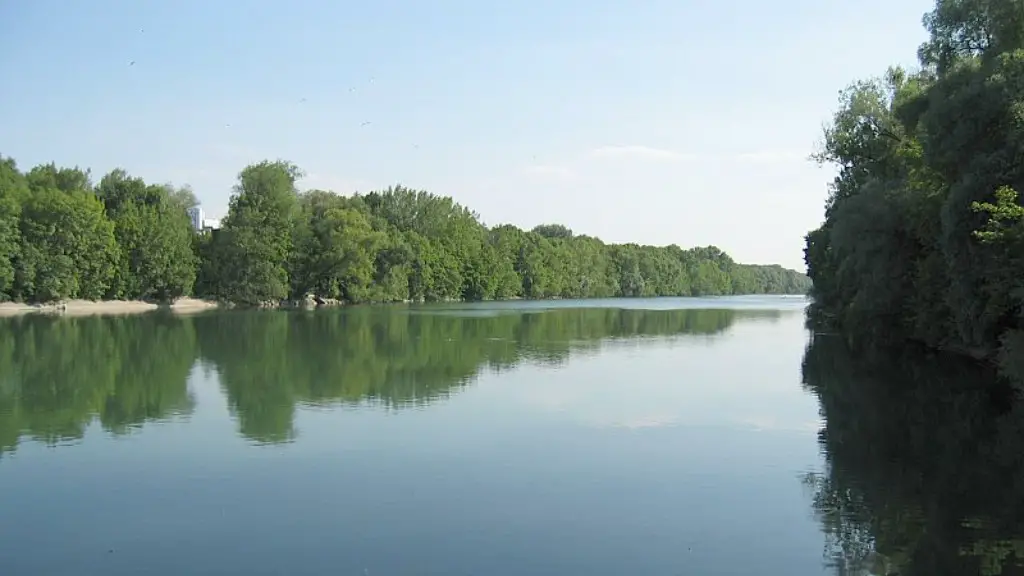The Mississippi River is not just the fourth-longest river in the world but also the most economically important river in North America. Stretching nearly 2,500 miles, it is an integral part of the US economy and a vital link to industry and transportation, supplying goods to a vast majority of the country. But the question often arises–does the Mississippi River stink?
Ever since industrialization in the late 19th century, the Mississippi River and its tributaries have been polluted by various forms of industrial waste and human sewage, about which environmentalists and ecologists have raised raised multiple alarms. For instance, the presence of agricultural contaminants, such as nitrates, has caused the river to stink in certain areas. Animal waste from intensive pig, beef, and poultry production plants often ends up directly into the river, which may be one of the main causes of the smell. In addition, the large volumes of water released by power plants, factories and wastewater treatment plants into the river add to the smell, as do accidental oil spills by barges and tankers going up and down the river.
According to Dr. Lynn Gallagher, professor of Environmental Science at the University of Southern Mississippi, “The Mississippi River stinks because of the immense amount of waste that is directed straight into the river. Not only that, but the waste is often not treated to the standard we would want, and contains bacteria and virus that can be harmful to the environment, and if ingested, to organisms, humans included. It’s no surprise the river smells, given the amount of pollutants that are directed into it every day.”
The smell of the Mississippi River is unmistakable and not just confined to certain areas. Combine this with the water being filled with pollutants, and one can conclude that the stench is indicative of an underlying environmental concern. Factors such as improper sewage treatment, sedimentation, and lack of enforcement when it comes to dumping regulations into the river all contribute to the smell.
The state of Mississippi has been proactive in trying to protect its water resources, deploying solutions such as monitoring, providing wastewater treatment facilities and other initiatives in order to help keep the Mississippi River clean. However, these efforts are not enough to counter the effects of intense mining, massive agricultural operations, and poultry and meat processing plants, which continuously dump their waste into bodies of water.
The Fungai Problem
One problem with the Mississippi River’s smell is a growth of toxic fungal blooms that have been discovered at an alarming rate. The funghi production has been found to produce odors or unnatural smells that are dangerous to people and the ecosystem. This has been cause for much concern and state officials have be diligent in finding out the origin of those blooms. A major contributor to the funghi blooms has been found to be agricultural runoff. This runoff is mostly groundwater that is filled with pollutants that are harmful to the environment and the plants and animals that live in them.
The funghi blooms, combined with agricultural runoff and other pollutants entering the river, have led to an increase in foul smells, leading to a big increase in complaints from people living near the Mississippi River. The Environmental Protection Agency (EPA) and the respective state governments have responded with regulating more strict enforcement and more testing and monitoring. This has been effective in reducing some of the odors from the river, but the underlying problem still remains.
To further combat the problem of the Mississippi River’s smell, states are now requiring larger factories and industries to install pollution control systems that filter and cleanse the water before it is released into the river. Additionally, some state governments are now offering grants for local farmers to encourage the use of conservation practices and to reduce the amount of chemicals used in farming. These efforts have been effective in reducing the amount of pollutants that enter the Mississippi River.
The Effects of Pollution On Animals
The smells and pollutants in the river have a profound effect on the wildlife and animals that live in and near the river. Aquatic animals, like fish, start to become ill in polluted water and die off, leading to a decrease in their numbers. In addition, polluted water can cause algal blooms, which can create an imbalance in the ecosystem by disrupting natural food chains. Animals like wolf eels, jellyfish, and crabs are very sensitive to changes in the environment and can start to suffer if the river is not properly taken care of.
The Army Corps of Engineers has been working to help improve the quality of the Mississippi River. To do this, they have been working on a number of projects that will help control the amount of pollution that enters the water, like controlling the amount of runoff from farms and installing drainage systems to filter out contaminants. Additionally, they are developing new wastewater treatment methods that can reduce the amount of pollutants that enter the river.
The Mississippi River Commission also works with states to help clean up the river. The Commission has been working on projects to reduce the amount of sediments, pollutants, and other contaminants that enter into the water. This is accomplished by installing monitoring devices to keep track of pollutants and to develop strategies to remove them. Additionally, they are working with the EPA to create regulations that limit the amount of pollutants entering into the river.
Citizen Groups Advocating Cleaner Water
The fight to keep the Mississippi River clean has been supported by many citizens’ groups. These organizations are dedicated to preserving the river’s health as well as raising awareness of issues facing the river. One of these groups, River Guardian, is an organization that educates citizens on the effects of water pollution and works to protect the Mississippi River from various forms of pollution.
River Guardian works with communities, businesses, and citizens to help improve the health of the river by organizing events and campaigning for cleaner water policies. They have created a number of programs and projects to address the issues of pollution in the river, like organizing river clean-ups and advocating for stricter water regulations. Additionally, they are working to improve the water quality by promoting the use of treatments and filtration systems.
The Mississippi River has a long history of environmental issues and the concerns have grown more pressing over time. As the river is increasingly becoming an integral part of the US economy, the consequences of pollutants in the form of a strong smell are that much more apparent and worrying. With that said, there are solutions being put in place and efforts being made in order to ultimately improve the quality of the water and, in turn, the river’s smell.
Legislation that Protects the River
The U.S. government has been aware of the environmental issues surrounding the Mississippi River, and as a result, has enacted policies and issued regulations to protect the water quality. At the federal level, the Clean Water Act of 1972 (CWA) was created to ensure the quality of the nation’s waters. The CWA sets standards and limits for pollution, and it requires industries, municipalities, and other organizations to obtain permits if they discharge pollutants into the river.
In addition, the EPA has issued regulations on the release of certain pollutants into the river. The Mississippi Department of Environmental Quality has also implemented a variety of programs and regulations to ensure that the river is healthy, including the Mississippi River Improvement Program, which monitors and enforces water quality standards. While the regulations are necessary, it is also important for individuals living near the river to take responsibility and not partake in activities that damage the river’s health.
The federal and state governments have taken action to protect the quality of the Mississippi River. However, the actions of citizens are essential for the success of those efforts. People living next to the Mississippi River need to be aware of the environmental risks that come with activities like littering, dumping, and the careless usage of chemicals. People who live near the Mississippi River can make an impact by volunteering for clean-up efforts or supporting organizations that work to provide a clean and healthy Mississippi River.
The Importance of Properly Disposing Waste
One issue surrounding the smell of the Mississippi River is the improper disposal of waste. Sewage, pesticides, and chemicals released into the water can contribute to the odors. To mitigate this issue, regulations have been put in place to ensure the proper disposal of waste. It is illegal to pour any kind of material into public waters and people must dispose of their waste properly.
The Mississippi Department of Environmental Quality (MDEQ) is in charge of regulating the proper disposal of waste. The department also has regulations in place that limit the amount of pollutants that are released into the river. Additionally, MDEQ has set up monitoring systems to detect pollutants, and inspectors regularly patrol the banks of the river to ensure that people are adhering to regulations.
Even if citizens are not directly in contact with the Mississippi River, the effects of improper waste disposal will be felt. People not living near the river can help keep it clean by using biodegradable products and recycling whenever possible. Additionally, people can volunteer their time to participate in clean-up efforts or donate to organizations that work to protect and preserve the environment.
Economical Implications of Pollution
The Mississippi River serves as an important resource for transportation and commerce, supplying goods to much of the Upper Midwest, and pollution has a significant impact on the river’s economy. Pollutants cause more issues like the disruption of marine and aquatic life, alteration of natural habitat, an increase in sedimentation and water contamination, which all in turn result in an economic loss.
The economic impacts of pollution on the Mississippi River will also include decreases in property values, as pollution can make certain areas of the river uninhabitable for aquatic species. Furthermore, pollutants can also hamper fishing and tourism, which are important economic resources for many communities along the river. The tourism and recreational fishing industries have taken large economic hits because of water related incidents and this has had a large impact on the local economy.
Furthermore, pollution can lead to inconveniences for people living near and using the Mississippi River. For example, chemical runoff and sewage can increase the presence of harmful bacteria in the river, creating an environment that is dangerous and unpleasant for people to swim in and boat on. In a similar vein, the pollution in the water also causes an increase in bad odors and smells, making it unpleasant for people to be near.
Organizations and leaders are working to improve the Mississipi’s water quality and reduce the economic impacts of pollution. For example, conservation efforts such as reforestation and wetland protection are being put into place to reduce runoff and sedimentation, which will help improve the water quality of the river. Additionally, businesses and industries are investing in green technologies and efficiently managed wastewater systems to reduce the amount of pollutants released into the river.





